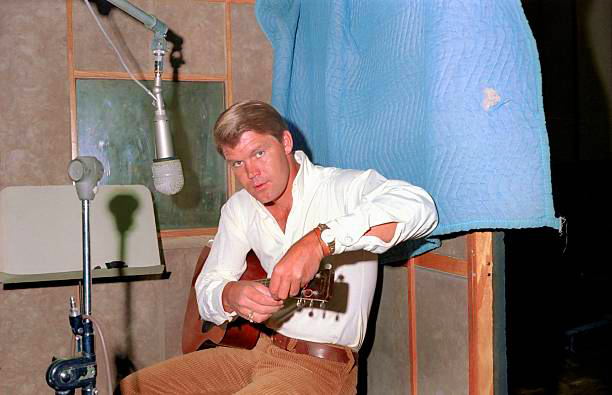“Wichita Lineman” is an American masterpiece — a timeless portrait of prairie-gothic isolation and desperation. Recorded in May 1968 by country-pop crossover sensation Glen Campbell, songwriter Jimmy Webb’s ballad of everyman angst spins blue-collar pathos into a haunting meditation on existential desire, culminating in one of most profound expressions of love and longing in the annals of popular music.

Campbell and Webb previously teamed in 1967 on the Grammy-winning “By the Time I Get to Phoenix,” with “Wichita Lineman” evolving out of Campbell’s request for another “geographical” song. Webb drew inspiration for the new composition from memories of a drive west through rural Oklahoma, the state of his birth.
“There’s a place where the terrain absolutely flattens out,” Webb recalled to the BBC. “It goes on that way for about 50 miles. In the heat of summer, with the heat rising off the road, the telephone poles gradually materialize out of this far, distant perspective and rush towards you. And then, as it happened, I suddenly looked up at one of these telephone poles and there was a man on top, talking on a telephone. He was gone very quickly, and I had another 25 miles of solitude to meditate on this apparition. It was a splendidly vivid, cinematic image that I lifted out of my deep memory while I was writing this song. I thought, ‘I wonder if I can write something about that?’”
Suffice to say he could. The “Wichita Lineman” Webb created — a solitary, introspective engineer tasked with maintaining the county-owned telephone system — spends his days traversing the asphalt ribbons of south-central Kansas, “searchin’ in the sun for another overload.” Despite the close attention paid to physical detail, Webb’s true focus is the psychological landscape: perched atop a utility pole in the middle of nowhere, the unnamed, overworked lineman yearns desperately to connect — to reach out and touch someone, as the old telephone company jingle goes. But his lover is miles away: he can only hear her “singing in the wire,” a disembodied voice hurtling across time and space.
Webb continues turning the screws in the next verse, dashing any imminent hope for a break from the monotony and melancholy of the lineman’s existence. Then comes the gut punch.
“And I need you more than want you,” Campbell intones. “And I want you for all time.” It is an extraordinary couplet — a declaration of love (or is it fear?) stripped of all pretense and metaphor, a distress signal made all the more poignant by Campbell’s searing vocal, further amplified by a repeating keyboard motif evoking the flashes and clicks of Morse code.
Campbell recorded this monument to heartland heartache before Webb could supply a third verse or a bridge. Campbell addressed the latter’s absence by improvising an elegiac guitar solo reportedly performed on a Danelectro baritone guitar belonging to Carol Kaye, a member of the Wrecking Crew, the loose coterie of Los Angeles session musicians that cut “Wichita Lineman” at Hollywood’s Capitol Recording Studio under the supervision of producer/arranger Al De Lory, who summons a range of orchestral and electronic effects to bring to life the lineman’s professional and personal plight.

Word of the “Wichita Lineman” session did not reach Webb until he crossed paths with Campbell a few weeks later. “I said ‘I guess you guys didn’t like the song,'” Webb recalled to the BBC. “[Campbell] said ‘Oh, we cut that.’ I said ‘It wasn’t done! I was just humming the last bit!’ He said ‘Well, it’s done now!'”
Campbell’s recording of “Wichita Lineman,” which appeared on his 1968 album of the same name, climbed to number three on the U.S. pop charts, also topping the country charts for two weeks and winning a Grammy Award for Best Engineered Recording (Non-Classical) for engineers Hugh Davies and Joe Polito. It additionally earned Grammy nominations including Record of the Year and Best Male Contemporary Pop Vocal Performance. Singers including Tom Jones, Johnny Mathis, Andy Williams and Robert Goulet recorded their own renditions of the song in the wake of Campbell’s success, and in 2020, “Wichita Lineman” was selected by the Library of Congress for preservation in the National Recording Registry.
Although Webb was initially dismissive of “Wichita Lineman,” which he considered “unfinished,” he made peace with his achievement over time. “I just tried to take an ordinary guy and open him up and say ‘Look, there’s this great soul, and there’s this great aching, and this great loneliness inside this person, and we’re all like that,’” he told the BBC. “We all have this capacity for these huge feelings.”
Wichita Lineman (KORD-0024)






